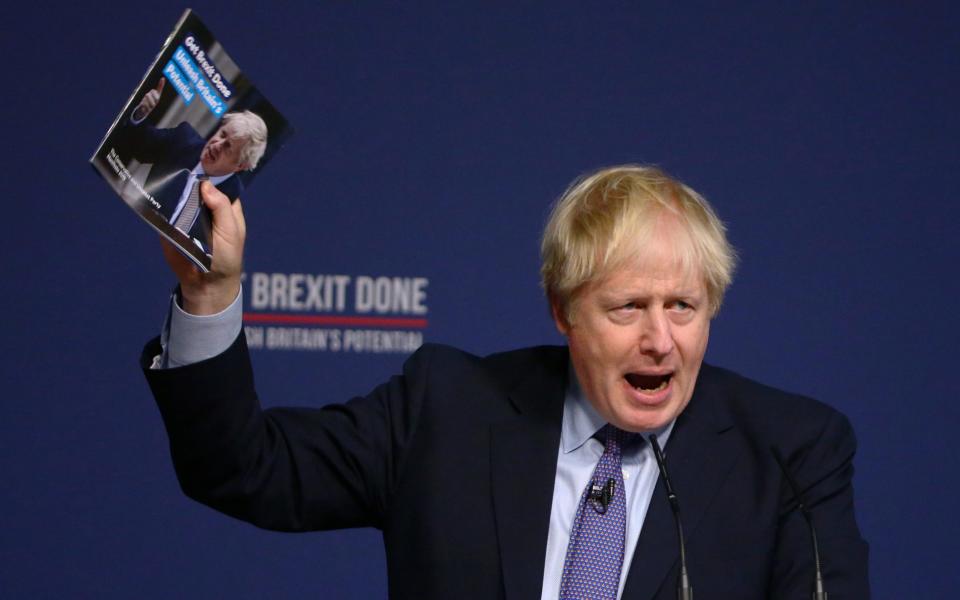What the Tory manifesto means for your money

Boris Johnson has launched the Conservative Party manifesto with a promise to “Get Brexit done” amid a raft non-Brexit policy suggestions.
The Prime Minister’s suggestions in the 64-page document were generally scant on detail, however, a promise to freeze income tax levels and funding for childcare could give a boost to your finances.
Tax: no rises but big promises disappear
Perhaps the biggest pledge made by the Conservative Party was not to increase the rate of income tax, National Insurance or VAT should it win the election. This is the opposite route taken by Labour and the Lib Dems who announced increases to income tax in order to fund pledges.
The Conservatives went a step further and said it would increase the level at which people start paying National Insurance to £9,500 up from £8,424. This should provide around £100 in savings to anyone currently contributing National Insurance and cost over £9bn in lost revenue by 2024.
Its “ultimate ambition” was to increase the level to the same as the personal tax allowance. This would mean workers paid no income tax or National Insurance on the first £12,500 of earnings.
Nimesh Shah of accountants Blick Rothenberg said: “Given the significant spending pledges, I would expect to see an indirect change to at least one of income tax, National Insurance or VAT, to deliver the much-needed revenue to the Treasury.”
As ever with manifestos, the most interesting policy was one that was not included. The Conservatives had previously pledged to increase the point at which someone becomes a higher-rate tax payer from £50,000 to £80,000.
Mr Shah added: “This measure would have given a tax cut of up to £6,000 but was estimated to cost the Treasury around £8bn. The proposal appears to have been dropped completely, and it’s difficult to now see if this measure will be introduced.”
There was also no relief for the self-employed and those caught by IR35 rules – which will force many contractors to be classified as being employed rather than a business. Many would have been hoping for a change to the rules and the rollout by April 2010, however the manifesto made no mention of the policy.

Childcare: back-to-school in the summer
This was a major funding pledge from the Tories as the party announced a £1bn pot to increase the availability of “wraparound childcare” – provided by schools but outside of school hours and term times.
The Conservatives said they would provide £250m a year for three years to allow schools to expand their “wraparound care”. A further £250m fund would be created to help schools fund the initial provision of care.
Overall this should mean 250,000 more primary schools offer childcare over the summer holidays.
Pensions: locking in rises and fixing quirks
The state pension “triple lock” will be retained by a Conservative government, in line with its rivals. This means state pension will increase either by inflation, 2.5pc or average increase in earnings – whichever is highest at the time.
There were also vague commitments to amending pensions rules to “protect pension pots from being plundered by reckless bosses”, while the Party supports creating hybrid pension schemes that are a mix of “gold-plated” final salary and defined contribution schemes generally offered by employers now.
A review of obscure pensions policy that has affected nearly 1.2 million lower earners – mainly women – will also take place, the manifesto said. The quirk limits how much tax relief low earners receive on their pensions savings.
The rules currently mean that – depending on how an employer sets up their pension scheme – anyone earning between £10,000 and £12,500 does not receive a pension top-up from the Government, despite being entitled.

Landlords: on your side, except for...
The Conservative Party reaffirmed its commitment to introducing 25-year long mortgages and make it easier for banks to lend to potential homebuyers.
This was the foundation of a housing policy that was not very beneficial for landlords. The Tories said they would create a “fairer rental market”, committing to abolishing “no-fault evictions”.
It will also legislate to create a “lifetime deposit” meaning renters do not need to stump up a large deposit to give to landlords every time they move.

The manifesto said: “This will create a fairer rental market: if you’re a tenant, you will be protected from revenge evictions and rogue landlords, and if you’re one of the many good landlords, we will strengthen your rights of possession.”
There was no upgrade on the last Government’s commitment to build 300,000 homes a year by 2025.
Social care: awaiting details
Unlike rivals, the Tories were scant on details on how to fund social care, potentially scarred by the damage the “dementia tax” did to Theresa May’s campaign in 2017.

 Yahoo Finance
Yahoo Finance 